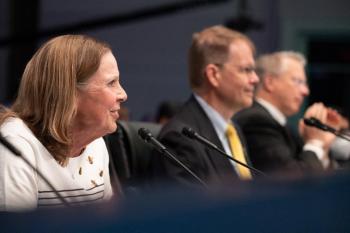Spellers never want to hear the “dreaded bell” that signals that they’ve gotten a word wrong in the Scripps National Spelling Bee and will be leaving the competition. But this year, the ding will be accompanied by something they’re not used to hearing on the stage – words of praise for a job well done.
 “It started last year,” said Head Judge Mary Brooks. “I have never done it before. It has always just been, ‘Ring the bell.’”
“It started last year,” said Head Judge Mary Brooks. “I have never done it before. It has always just been, ‘Ring the bell.’”
Last year – as in 2021, the year the Bee was largely virtual, except for the in-person Finals in Orlando. Brooks said after the effects of the coronavirus pandemic on schooling and social networks, it seemed like spellers (and viewers) would benefit from more kindness.
“I think we were all in the mode that we just need each other,” she said. “It seemed to have a big impact last year.”
Brooks said she received a letter from an English teacher telling her that the meaningful and empathetic feedback “meant so much.” One father told her he thought his child would remember her comment more than anything else – and that leaving the 2022 stage with dignity and a personal comment meant the world.
Other feedback came through Bee staff and from the smiles of spellers like Henry Mathewes, speller 230, who Brooks told was a “very impressive young man.”
“I fully expect to hear your name in many arenas in the future,” she told him.
The reactions, she said, made her feel like she was doing the job she was supposed to be doing.
 Brooks said she had been told in the past to keep a poker face in response to spellers, but often had trouble doing so. Last year was the first time she had the latitude and was given the encouragement to praise the spellers for the work it took them to get to the national Bee.
Brooks said she had been told in the past to keep a poker face in response to spellers, but often had trouble doing so. Last year was the first time she had the latitude and was given the encouragement to praise the spellers for the work it took them to get to the national Bee.
She said she hoped the praise helped temper the impact of the bell. After all, she said, it’s not hard to find something to praise about each speller.
When Ishan Ramrakhiani, speller 5, misspelled “splanchnicectomy,” Brooks praised him on a one-on-one interview he conducted with Pronouncer Dr. Bailly, which was printed in the Bee Keeper, the spelling bee magazine. When speller 20, Braydon Syx, misspelled “tektite,” she referenced a news story that quoted him and said with a combination of “hard work, luck and perseverance” he would continue in the competition.
“I think you have demonstrated all of those things and more,” Brooks said. “Thank you for being such a strong and poised competitor.”
Brooks said she researched each of the spellers, looking at information they submitted and other available details to determine what to say to them. She wants to note if they are aging out of the competition or have years to go; if they participated in the virtual Bee and are in person for the first time; if they have relatives who have been spellers, too.
She said she usually has a sense of what she wants to say, but sometimes makes a connection during the competition – as she did when speller 170, Antonia Antov, misspelled “camporee,” which is “a gathering of boy scouts or girl scouts especially from a given geographic area, usually in a camp, for purposes of contests or exhibitions in scoutcraft or campcraft.”
“I know you enjoy camping so I’m sorry that you missed this word, but add it to your repertoire and we’ll hope to have you back next year,” she told the seventh grader.
Brooks said she aims to be present in the moment. She said she expects some spellers will be stunned enough by their loss that they won’t process her remarks. But she hopes their parents will remind them of what was said about them.
“I think it’ll add just one more positive memory for them,” she said. “Anything that can be said to a young person to build them up or give them confidence is pretty darn important.”